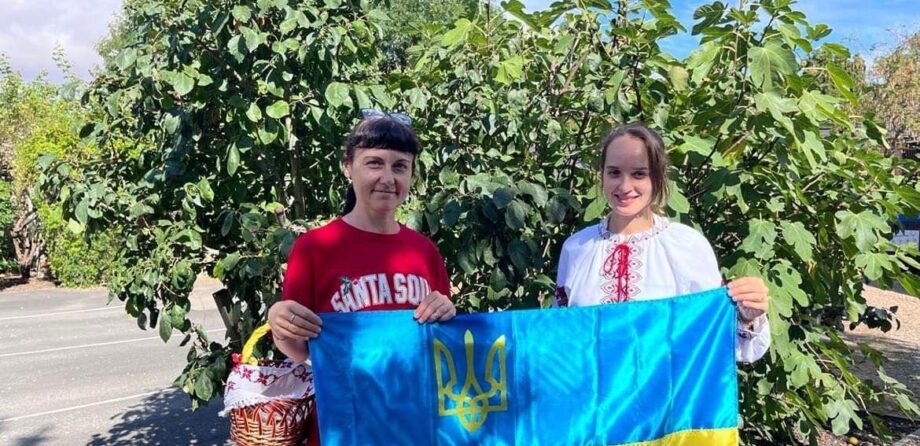
Supporting refugees
In February, Russian forces invaded Ukraine. The first European war for decades threw the spotlight onto the millions of women and children who were displaced.
Nurseries have been caring for refugees for years – some give their experiences to Nursery News.
Ukrainian staff at Beach Babies, Cambridgeshire
“On behalf of all Ukrainians, we are lucky to get the opportunity to work with such a wonderful team of incredible people like Beach Babies.” Mila, Viktoria and Karine.
In April, owner Tracy Hutchison took in a family from Kyiv. Once social worker Viktoria’s three children were settled in school, she began working as a chef and cleaner at Beach Babies. Her son Vitaly, 15, enjoys work experience there and the children adore him.
She was joined by doctor friend Mila who gives one-to-one care to an autistic child while learning English. She hopes to be able to practise as a doctor in England soon. Karine, a chemical analyst, arrived with her son, Pavlo, 17, and she also works in the nursery. Pavlo helps to translate in their work meetings. He is now doing so well at sixth form college he has applied to read maths at Cambridge University.
The ladies are enthusiastically learning English with the younger nursery children. Although language was initially a barrier, they have had basic safeguarding training.
Tracy says: “They had no experience really. Viktoria knew about safeguarding, she now works with children every day, making bread, doing cooking activities and adding value.
“It’s really helping them. It’s been very traumatic – many people they know have died and Karine can’t return to Mariupol. They talk about it with each other but the children bring them back to earth. You can’t brood when children are asking you to play with them!
“The ladies are so proud of their country. Their passion brings their descriptions to life for the children.”
There are huge benefits for the nursery:
- They have given the team a wider understanding of the world’s problems – “it’s very easy to get worry about energy bills and not see the bigger picture – when you talk to someone with relatives fighting on the front line you realise cancelling your holiday is not the biggest problem.”
- Awareness of different ways people learn to speak English
- Children are developing their own language skills while teaching the adults, which is really empowering
- The ladies have taught them some Ukrainian songs and basic words
- Vitaly has spent time with one little boy who had been excluded from his previous nursery and his behaviour is very positive now
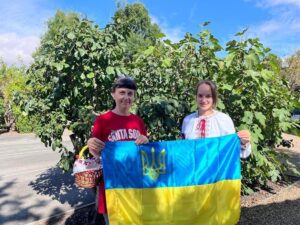
Photos of Ukrainian day – We celebrated Ukrainian Independence Day. Our Ukrainian ladies talked to the children about some of the differences and similarities between the two countries. They wore vyshyvanka, embroidered shirts or dresses.
Mila, Viktoria and Karine wrote for Nursery News: “It’s not just about improving our English skills. From the first day here, we felt incredible support, understanding, desire to help.
“Work helps a lot, not only to distract us from the news, but also for us to see and understand that other people are not indifferent to what is happening in our country. It is stressful and difficult, for people who left everything.
“We are now in a different country, with different traditions, customs, language, but working here, we are surrounded by such incredible support, openness, sincerity. We have the desire to improve things, to learn something new, for which we will be grateful for our whole lives.
“It allows us to become independent, take care of our families and learn about your culture and traditions. It’s a good start for all of us. Many thanks to your country for your incredible support and help for Ukraine and for our people.”
Beach Babies added: “We are so lucky to have these three amazing ladies working for us. They come to work with such a positive attitude that it helps everyone around them, staff and children. They are kind and patient with everyone which means they have quickly become firm favourites with the children. They have endless enthusiasm, a keenness to learn and openness to new ideas.
“Every role they do and every task they undertake they do to the very best of their ability. They come from diverse backgrounds but have bought with them transferable skills and a ‘can do’ attitude.
“They would not have chosen to come here and the news from their family and friends at home is often terrible, but they are teaching us all how to live our best life regardless of what situations we face.
“One day we hope that they will be able to settle back in their homes in Ukraine and that we can visit them there and see the lovely things they describe to us.”
Free places for refugee children – Nestlings Nursery, Cardiff (chasing pics)
“It’s good for the other children to grow up with children from different backgrounds” – Misty Ardouin, owner.

Nestlings work with a local charity that supports refugee families and each day offer one free place to a child so their families can find work and study. The children are mostly from Africa but some Ukrainian children will be arriving soon. They wanted to do something to help the community.
They have also recently taken on a lady from Ukraine who has childcare experience – she has little English so they use Google Translate, but she “manages to have a laugh” with the staff.
Being located in a big multi-cultural city, the nursery cares for lots of children for whom English is their second language. The children accept the refugee children.
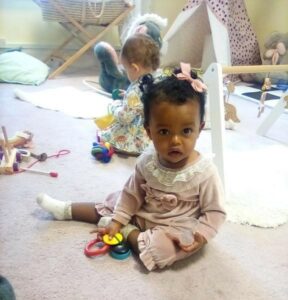 Misty said: “When they are babies, they pick up English so easily, much quicker than adults. The language barrier is more with parents. We did have a translator from the refugee charity, so could provide initial information about what they needed to bring.”
Misty said: “When they are babies, they pick up English so easily, much quicker than adults. The language barrier is more with parents. We did have a translator from the refugee charity, so could provide initial information about what they needed to bring.”
A huge challenge is supporting the children to settle. The nursery provides lots of reassurance for both child and parents. Staff all have trauma training and some did specific training to learn about different ethnicities and what to expect from different cultures. They learn a few words in the child’s native tongue to begin with.
“They have lots of upheaval and asylum seeker children take on their parents’ worries. One eight-month-old baby took time to settle, but once they have stability, mum is happier and now he’s coming three days a week which has helped him into a routine.
“She’s a first time mum so we have helped her to understand how to deal with him. She hadn’t had that support before. We helped with development and practical skills, taught her the importance of routine. She started making friends with other families, it’s nice and social for them as well.”
Benefits:
- The other children grow up with children from different backgrounds
- The refugee children feel welcomed and develop friendships
- The staff gain from helping people who really need that help, it gives them “warm feelings, a sense of purpose”. They are reminded how important their role is, with a sense of responsibility.
Challenges:
- Because the places are free, the families don’t always bring their children. They had to explain the importance of routine in settling and forming bonds with other children.
Misty’s advice:
Go through a refugee support charity, otherwise it’s hard to vet people and know who needs help. The charity knows each family’s situation so you know you are legitimately providing for a family that needs it.
Supporting a child who experienced bombing in Ukraine – Cumberland Road Nursery and Pre-School (LEYF), Newham
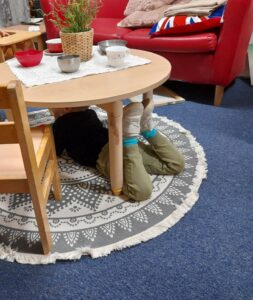
Ivan seeking refuge credit: London Early Years Foundation.
“It’s hard seeing those moments when he gets scared.” Pethro Thomas, Deputy Manager.
Ivan (not his real name) was really happy going to his Ukrainian nursery until one day it was shelled and he had to hide in the basement. The three-year-old has been traumatised by this terrifying experience that most people will never have to endure. Ivan didn’t enjoy going to his nursery after that.
Months later, he’s safe and settling in well at his new London nursery where he has made friends.
Pethro told Nursery News: “Sometimes he gets afraid when it’s noisy, so he retires into a quiet area, the home corner and goes under the table with a toy to comfort himself until he feels safer. I went under and played with him. Once he realises he’s safe again he will come out and play.”
Staff are trained in adverse childhood experiences and trauma. Overcoming language barriers has been tough but one of LEYF’s other nursery managers nearby speaks Russian so has been explaining to his mum how Ivan has been doing at nursery and assisting with other local support the family can access.
Staff use flash cards to help communicate with Ivan and have already learned a few Ukrainian phrases. He can now speak a few English words and they all sign Makaton together. His key worker spends some time each day helping him with his language skills and building up a bond so he feels safe and happy.
The other children have been friendly, playing with him and helping him to fit in, according to Pethro. They have picked up a few words in his language. “They know when a child doesn’t understand and bend their heads down to get that eye contact with him. They have been so kind.
“We have a few other children who speak Eastern European languages when their parents pick them up, so Ivan doesn’t feel like the only one who speaks differently.
“We’re big on embracing and celebrating different cultures. We did a lot of activities around Ukraine, helping children understand about different countries. We all got dressed up in yellow. If you understand different backgrounds and learn about other countries, you get to be more empathetic. We can see that already.”
Caring for Ivan has made the war in Ukraine more real to the staff – they feel they are making such a difference in this child’s young life.
Pethro added: “For us it’s hard seeing those moments when he gets scared, it’s emotional to see his response and how affected he really is. It pulls on the heart strings. We are here to just keep supporting him and nurturing him. It’s a really difficult time for him, new country and new people. He’s been through trauma, he just needs people to try to understand him. It’s sad to see at such a young age.”
Supporting two Ukrainian boys with fathers on the frontline – Humpty Dumpties, Lichfield
“It was a new experience for us” – Tim Hopkins, Strategic Development Manager.
Until the summer, Humpty Dumpties nursery had not looked after refugee children – now they have supported two boys from Ukraine.
Their first stayed with them from July until he started school in September with his sponsor family’s son. He left his father behind fighting the war. The nursery used a special translation app which helped to settle him and to communicate with his mum.
Tim said: “Unfortunately we’re based about 200 yards from the West Midlands ambulance service. He loved playing outside but would run inside at the sound of the sirens. Because we had no experience of supporting someone like him, we hadn’t thought that would be a trigger.”
Although the four-year-old bounced back, it resulted in two members of staff accessing a trauma-informed practice course which has proved very positive for the whole setting.
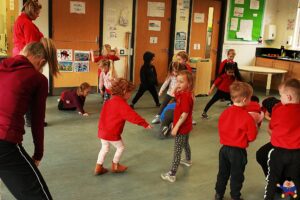
“The staff found it so rewarding and it really influenced how they approached their new cohort of children. It’s also helped other children with traumatic backgrounds – those living with foster parents, special guardianship arrangements – we have improved our offer because of this experience.”
They are now supporting a three-year-old boy in the pre-school. His father is working for Ukrainian emergency services. Although the boy had accessed extra support in Ukraine for behavioural needs and suffered trauma and upheaval on top of that, he’s settled very well. He has a good group of friends. Staffordshire County Council gave extra funding for additional support for him too.
The nursery staff experienced difficulties talking to his mum about his behaviour – after a week they discovered that the mother and child spoke Russian and not Ukrainian, so the translation app had not worked well for them. She had not wanted to let on she spoke Russian because people associate the language with the aggressors. Once the nursery assured her they would not judge anyone in this way, communication became much easier.
For both children, the council paid for a stretched 15 hour offer and the nursery made up the difference so they could access 20 hours. They set up video calls prior to them arriving at the nursery and spoke sensitively to their children before the refugees arrived. Most of them knew about the war from seeing images on the television and speaking with their own families about it. One girl was worried that the war would happen in Lichfield, so staff had to comfort her and explain that it wouldn’t happen here.
Staff also explained to the children about the need to speak slowly and carefully, repeating words and being helpful by showing them where to find things they needed.
“We just wanted to support those families in Staffordshire who took on Ukrainian families, it’s something really great to do. But we have learned to really think about ACEs and trauma and found out about more than we did before about our families. Both mums have lost their social life so we put them in touch with the local Ukrainian Centre in Derby.
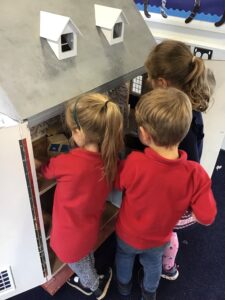
“Staff have really risen to the challenge with open arms – they have felt blessed and benefited by having this experience and sharing that in the staff team. They are interested in new ways of communicating and to get themselves ready many learned some Ukrainian phrases to use in the nursery. They looked at what Ukrainian culture was like to incorporate into daily curriculum for all children. Our chef has been introducing Ukrainian food into the menus which also helped to settle the boys.
“The children have responded really well. We explained that their new friends hadn’t been here long enough to learn many words – they have both been embraced into the birthday party scene and the two mums have been included too, invited out for coffee and to join in with yoga classes.”
Tim’s advice to nurseries new to supporting refugees:
- Ask your local authority if another nursery that has done something similar and chat to them around things they have learned as a result
- be really open minded – avoid thinking about scenes on tv but try to find out about their experiences in a sensitive way
NDNA’s advice: supporting children from war-torn countries
Children fleeing from war have gone through immense change, stress, trauma and will be struggling emotionally to process this. They need to be with familiar adults.
You may want to adapt your practice including:
- A focus on trauma-informed practice and how to support both families and children (not just ACEs training)
- Consider how to make your setting relevant, homely, calm, relaxed, loving, responsive to each individual child, with unhurried routines
- Resources needs to focus on what the practitioners need to do – not just what children will display
- The importance of play:
- What a child may display: building towers, aeroplanes and dropping bombs –children will need to use play to process the events they have gone through
- Play therapy: how practitioners can use play to bring healing and signposting to appropriate professionals to support this
- Attachment:
- Children may display disorganised attachment as parents/carers/grandparents/friends have ‘disappeared’ out of their life as they are back in Ukraine.
- Children will need comforters from home
- Settings will need smaller group sizes, consistent key workers, much longer settling in time; also support for other children when they are seeing children very upset
- Behaviour:
- The importance of promoting positive behaviour – focussing on the cause
- what a child is going through will manifest in their behaviour – separation anxiety, refusal to eat unfamiliar food, etc.
Similar Articles
Top tips: Supporting your team’s well-being

Early years activity: Frozen balloon explorers


